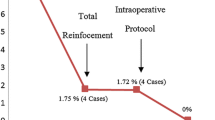Abstract
Background
Robotic sleeve gastrectomy has been increasing in annual incidence in recent years. Although rare, post op bleeding and leak in these cases can lead to significant morbidity, mortality, and healthcare utilization.
Objectives
To determine preop comorbidity risk factors and operative techniques associated with risk of bleeding or leak within 30 days of robotic sleeve gastrectomy.
Methods
The MBSAQIP database was analyzed. A total of 53,548 RSG cases were included in analysis. Surgeries took place from accredited centers in the USA from 2015 to 2019.
Conclusions
Preoperative anticoagulation, renal failure, COPD, and OSA were found to increase in the risk for transfusion requirements after SG. Receiving a transfusion and smoking increased the risk for leak. Staple line reinforcement significantly decreased transfusion and leak rates. Staple line oversewing did not have an impact on bleeding or leak.
Graphical abstract

Similar content being viewed by others
References
Morales-Marroquin E, Khatiwada S, Xie L, et al. Five year trends in the utilization of robotic bariatric surgery procedures, United States 2015–2019. Obes Surg. 2022;32(5):1539–45.
Acevedo E, Mazzei M, Zhao H, et al. Outcomes in conventional laparoscopic versus robotic-assisted primary bariatric surgery: a retrospective, case–controlled study of the MBSAQIP database. Surg Endosc. 2020;34(3):1353–65.
Sebastian R, Howell MH, Chang KH, et al. Robot-assisted versus laparoscopic Roux-en-Y gastric bypass and sleeve gastrectomy: a propensity score-matched comparative analysis using the 2015–2016, MBSAQIP database. Surg Endosc. 2019;33(5):1600–12.
Birkmeyer NJ, Dimick JB, Share D, et al. Hospital complication rates with bariatric surgery in Michigan. JAMA. 2010;304(4):435–42.
American Society for Metabolic and Bariatric Surgery “Estimate of Bariatric Surgery Numbers, 2011-2020”, 2022, https://asmbs.org/resources/estimate-of-bariatric-surgery-numbers. Accessed 6/1/23
Kim J, Azagury D, Eisenberg D, et al. ASMBS position statement on prevention, detection, and treatment of gastrointestinal leak after gastric bypass and sleeve gastrectomy, including the roles of imaging, surgical exploration, and nonoperative management. Surg Obes Relat Dis. 2015;11(4):739–48.
Hernández M, Beltrán Herrera H, Martínez García V, et al. Stent management of leaks after bariatric surgery: a systematic review and , meta-analysis. Obes Surg. 2022;32(4):1034–48.
Gore® SEAMGUARD®. Bioabsorbable Staple Line Reinforcement. In: Gore Medical. https://www.goremedical.com/products/seamguard?xcmp=21183805-en_seamguard-reliability-matters_gmp_sem_text_generalsurgery_search_ga. Accessed 6/1/23
Echelon ENDOPATH™ Staple Line Reinforcement | Ethicon - J&J Medtech. https://www.jnjmedtech.com/en-US/product/echelon-endopath-staple-line-reinforcement. Accessed 6/1/23
Peri-Strips Baxter Specialty Site, https://advancedsurgery.baxter.com/peri-strips.
Tri-Staple™. 2.0 Reinforced Reload. In: Medtronic. https://www.medtronic.com/covidien/en-us/products/surgical-stapling/tri-staple-2-0-reinforced-reload.html. Accessed 6/1/23
Shikora SA, Mahoney CB. Clinical benefit of gastric staple line reinforcement (SLR) in gastrointestinal surgery: a meta-analysis. Obes Surg. 2015;25(7):1133–41.
Aiolfi A, Gagner M, Zappa MA, et al. Staple line reinforcement during laparoscopic sleeve gastrectomy: systematic review and network meta-analysis of, randomized controlled trials. Obes Surg. 2022;32(5):1466–78.
Gayrel X, Loureiro M, Skalli EM, et al. Clinical and economic evaluation of absorbable staple line buttressing in sleeve gastrectomy in high-risk patients. Obes Surg. 2016;26(8):1710–6.
Author information
Authors and Affiliations
Corresponding author
Ethics declarations
Ethics Approval
For this type of study, formal consent is not required.
Consent to Participate
Informed consent does not apply.
Conflict of Interest
The author declares no competing interests.
Additional information
Publisher’s Note
Springer Nature remains neutral with regard to jurisdictional claims in published maps and institutional affiliations.
Key Points
• An increase in the utilization of a robotic platform has been found for sleeve gastrectomy performed in the USA.
• Utilization of staple line reinforcement in robotic sleeve gastrectomy cases is associated with a lower risk of bleeding and leak within 30 days of surgery.
• Staple line oversewing did not have an impact on the frequency of bleeding or leak after robotic sleeve gastrectomy.
Rights and permissions
Springer Nature or its licensor (e.g. a society or other partner) holds exclusive rights to this article under a publishing agreement with the author(s) or other rightsholder(s); author self-archiving of the accepted manuscript version of this article is solely governed by the terms of such publishing agreement and applicable law.
About this article
Cite this article
Vosburg, R.W. Factors Related to Bleeding and Leak Rates After Robotic Sleeve Gastrectomy. OBES SURG 33, 2658–2661 (2023). https://doi.org/10.1007/s11695-023-06712-1
Received:
Revised:
Accepted:
Published:
Issue Date:
DOI: https://doi.org/10.1007/s11695-023-06712-1




